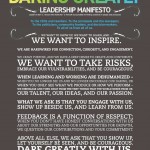Ever since Bill Clinton used the phrase ‘It’s the economy, stupid’ in his successful 1992 campaign for the US Presidency, it has been almost an article of faith that voters will, at the end of the day, elect leaders on the basis of economic self-interest.
Whether or not that was every completely true, recent events in Australian politics point to a new catch-phrase: ‘It’s about Trust, stupid.’
The last Labor government was thrown out in 2013 after a brilliant campaign by Opposition Leader Tony Abbott focusing on Labor’s broken promises (who can forget ‘Ju-liar‘) and change of leaders. There was a perception of turmoil and infighting, with the implication that you couldn’t be sure that the leader you elected would be the person running the country.
Fast forward 16 months and Prime Minister Abbott and the party he leads are deep in the doldrums. Voters in Queensland have given a damning verdict on the ruling Liberals, and again, broken promises – at the State and Federal level – are at the core of voters anger.
Fighting for his political career (and with the very real possibility that this will be a one-term government) in a speech to the National Press Club, Abbott conceded that he had broken pre-election promises. But he defended himself saying that ‘circumstances change’. His predecessor, Julia Gillard, made the same defense (in her case with greater justification – denied an absolute majority, a Carbon Tax was the price of coalition with the Greens).
Faced with a growing Trust Deficit, politicians frequently blame the media – with some justification. But they (and we the public) are equally to blame. We live in a time of rapid change, which means that difficult choices need to be made. But rather than engaging the public in a mature debate before an election, politicians choose to say whatever they think will get them elected and then wait until after they get voted in before implementing the painful policies they intended all along.
To be fair, politicians have always bullshitted to some extent. But over the last 10 years it seems to have gotten worse. The gap between they say (before elections) and what they do after the election has got ever wider. And the public is fed up and increasingly intolerant of bullshit, lies and manipulation.
There are lessons in this for all leaders – whether in government, civil society or business.
Trust matters. It matters a lot! Win a people’s trust and you will be able to lead them – even through painful change. If people trust you, they will be ready to make sacrifices for the greater good; they will go the extra mile for you. Faced with opposition, the people who trust you will go to battle for you, convincing the waverers and sceptics on your behalf that you are the right person to lead.
But if people don’t trust their leaders, they will resist all attempts to drive change. Furthermore, they will not listen to arguments for change – no matter how convincing – from someone they don’t trust. And faced with the undecided, a person who distrusts will go to battle against their leaders, working hard to convince the waverers (who could perhaps be persuaded either way) not to trust and not to go along with the leader’s agenda.
So what are the lessons for leaders?
1. You can’t expect people to trust you if you are not willing to trust them. This means engaging people in the difficult conversations about change right from the start, before you commit to policy, and certainly before you start implementing change. It means being up front about the painful choices you want them to make and risking that they will reject that choice. It means trusting the people you lead with real power to influence policy.
2. Lies, manipulation, bullshit (in other words, ‘playing politics’) is not a long term strategy. It may get you ahead for a short while, but people won’t have the wool pulled over their eyes for very long. Once you have become seen as a manipulator and bullshitter, your leadership is dead in the water.
3. A leader is not the same as a salesperson. People are sick of being sold to. Instead of being treated like passive sheep, they want to feel inspired, empowered, listened to and treated like intelligent human beings. Leaders lead conversations for change. (To be fair, as my friend Sue Barrett points out, great salespeople today don’t try to ‘sell’ you stuff, but instead listen and engage with their buyers, building trust and helping them move towards their goals with a fair exchange of value. But this, more enlightened, understanding of the sales process seems not to have reached our politicians yet!)
4. If you find yourself in a position where you have lost people’s trust, then say sorry like you mean it. This is only works (sorry Tony!) if you actually mean it! Apology is not convincing when the subtext is that you were right all along but things went pear-shaped because of circumstances beyond your control. Trust can be won back when you can convince someone that you have seen the error of your ways and are going to change.
5. Trust trumps the economy. The days when people would put up with being treated like idiots so long as they got their paycheck are over. If people stop trusting their leaders they will leave – or (even worse) they will stay and undermine the leader while continuing to draw a wage. The paradox is that organisations and leaders who put trust ahead of purely financial concerns will prosper, while those who sacrifice trust while chasing dollars, ultimately can’t compete.
As many people keep noting, we are in the middle of a paradigm shift – in politics, society and in business. Being able to build and sustain trust will be the most important quality of a leader as we go through these shifts. Unlike most management skills, trust is a metaskill – made up of values, beliefs, habits and the way we see ourselves and others. I offer a package of coaching sessions to leaders wanting to develop the metaskills of trust. See https://www.discovertheother.com.au/products-and-services/trusted-leaders-mentorship-programme/
Mike Lowe
Helping individuals and teams get into flow





